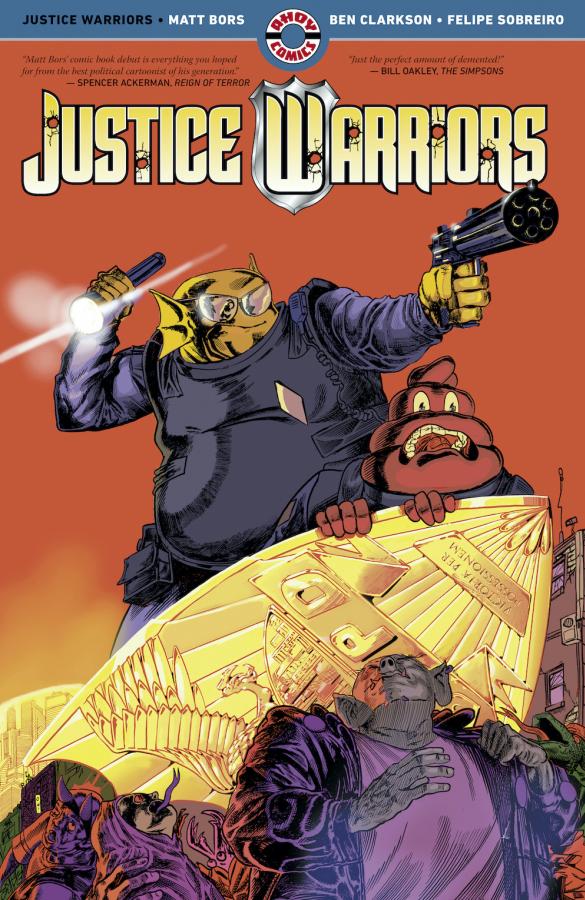Satire Carries a Badge: On “Justice Warriors”
A review of the satirical graphic novel "Justice Warriors," by Ben Clarkson and Matt Bors.

Let’s talk about postpunk for a second. If you’re familiar with the discography of Talking Heads, you’ve probably heard their song “The Overload.” You may even be familiar with the origin story of this particular song, which is essentially that Talking Heads decided to write a song in the style of Joy Division without ever actually having heard Joy Division. There’s something inspiring about that; a songwriting approach that’s somewhere between a game of Exquisite Corpse and an Oulipan constraint.
“The Overload” has been on my mind as I think about Justice Warriors. So too has 2000 A.D., the long-running British comics publication known for science fiction stories featuring a bleak sense of humor with the narrative’s political awareness turned way up. Justice Warriors is not a 2000 A.D. book; its creators, in fact, hail from this side of the Atlantic. And yet if you’d told me that this was an effort to create a kind of 2000 A.D. title absent 2000 A.D. I think I’d believe you. Gallows humor? Check. A sense of the absurd? Check. Riffs on contemporary politics? Check, check, and check again.

In fact, maybe “riffs on contemporary politics” is underselling things a bit. The Nib editor (and Pulitzer Prize finalist) Matt Bors is the co-writer here, along with artist Ben Clarkson. Will Menaker of Chapo Trap House contributed the introduction, and the front cover bears a blurb from Spencer Ackerman. All of that is to say that there are a lot of Pulitzer winners and finalists attached to a project where one of the main characters is a guy made out of poop.
Set on the outskirts of the utopian Bubble City, described early on as “the world’s first perfect city,” Justice Warriors is both a police drama and a satire of police dramas — plus modern technology, urban life, corporate doublespeak, internet culture, astrology, and pretty much anything else you could think of. This is a comic in which Swamp Cop (a cop who is also a Creature From the Black Lagoon-esque swamp monster) witnesses his partner get run over by a self-driving bus which then issues a halfhearted apology. “Apologies, citizens. Our route is optimized for no stopping,” the bus declares. “A gig medic will be with you in 12-15 minutes.”
There’s a lot to unpack there, but that brief snapshot of a scene indicates just how busy Justice Warriors can be. This is a graphic novel that will rarely lampoon one aspect of modern life when it can lampoon three or four in the span of a few panels. There’s also a density to many of the page layouts that recalls Howard Chaykin’s American Flagg! — another project that feels like an aeshetic ancestor of this one.
About our heroes: Swamp Cop is a corrupt cynic, prone to declarations like, “Sweet Serano Piss Christ!” Cadet Schitt — the aforementioned guy made from poop — is more the archetypal fresh-faced rookie. If you’ve watched enough police dramas, you’ve seen this dynamic before, except never quite like this. There’s also the matter of the city’s egomaniacal pop star mayor and Swamp Cop’s obsession with tracking down the self-driving bus that killed his partner.
Things escalate from the meeting of this unlikely pair, as a cult gains power in the city and the mayor’s abuses of power become even more baroque. Swamp Cop and Cadet Schitt gradually learn about each other, as is traditional in buddy-cop narratives; Justice Warriors hits a lot of familiar beats, even as it undermines them with each page. Clarkson’s art is equally adept at depicting relatively realistic characters and more stylized ones, from the mayor’s perfectly triangular nose to one supporting character who could be best described as an anthropomorphic blobfish. Bors also contributes art to short interludes that give a bit more flavor to this increasingly madcap and surreal city; throughout the book, Felipe Sobriero’s coloring shifts from traditionally dystopian to absurdly comedic and back again.
Justice Warriors isn’t the first satire of contemporary policing to also take the form of a police drama, bit it might be the most satire of its kind you’re likely to encounter. This book is relentless in the way it skewers its targets, and in doing so it reckons with one of the most effective ways to create satire, full stop: make the object of your ridicule look as absurd as possible to deny them any sense of power. Bors and Clarkson know how to do satire well, and this is a master class in it. You’re laughing at the satire of abuses of power to keep from crying from the very real abuses of power evoked in its pages.